The gracious Josette, recently ill, has disappeared from her bedroom in the great house of Collinwood. She did not exit through the door to the hallway, nor did she climb out the window. Josette’s aunt, the Countess DuPrés, asks the master of the house, haughty tyrant Joshua Collins, how her niece could have got out. Joshua says there is a secret passage, but he cannot imagine how Josette would know about it. He did not tell her, and the only other people who knew of its existence were his brother Jeremiah and his son Barnabas, both of whom are dead. Since Josette was engaged to Barnabas for a time and was later married to Jeremiah, perhaps one of them might have mentioned the passage to her, but this possibility does not occur to Joshua.
Everyone in the house becomes involved in a search for Josette. That includes untrustworthy naval officer Nathan Forbes, Nathan’s fiancée Millicent Collins, and Nathan’s wife Suki. Millicent does not know that Suki is Nathan’s wife. Suki introduced herself to the Collinses as his sister, and is content to go on masquerading as such so long as there is a prospect Nathan will pass along a great chunk of Millicent’s vast inheritance to her. Nathan did not expect Suki to turn up, and she has been making him extremely uncomfortable for the last couple of days. It has been magnificent to watch.
Nathan and Suki need to have a conference about some topics they cannot possibly discuss in a house where they might be overheard. It occurs to him that no one is living in the Old House on the estate. He tells Suki to wait for him there.
Nathan is not entirely wrong when he says that “there is no one living” in the Old House. However, there is one among those who are not living who is not simply dead. That is Barnabas, who has become a vampire. Suki enters the house and meets him.
Barnabas demands to know who Suki is. When she introduces herself as Suki Forbes, sister of Nathan, he soon declares “You are not his sister, you are his wife! Don’t bother to deny it.” He tells her that Nathan has no sister, therefore she could only be his wife.
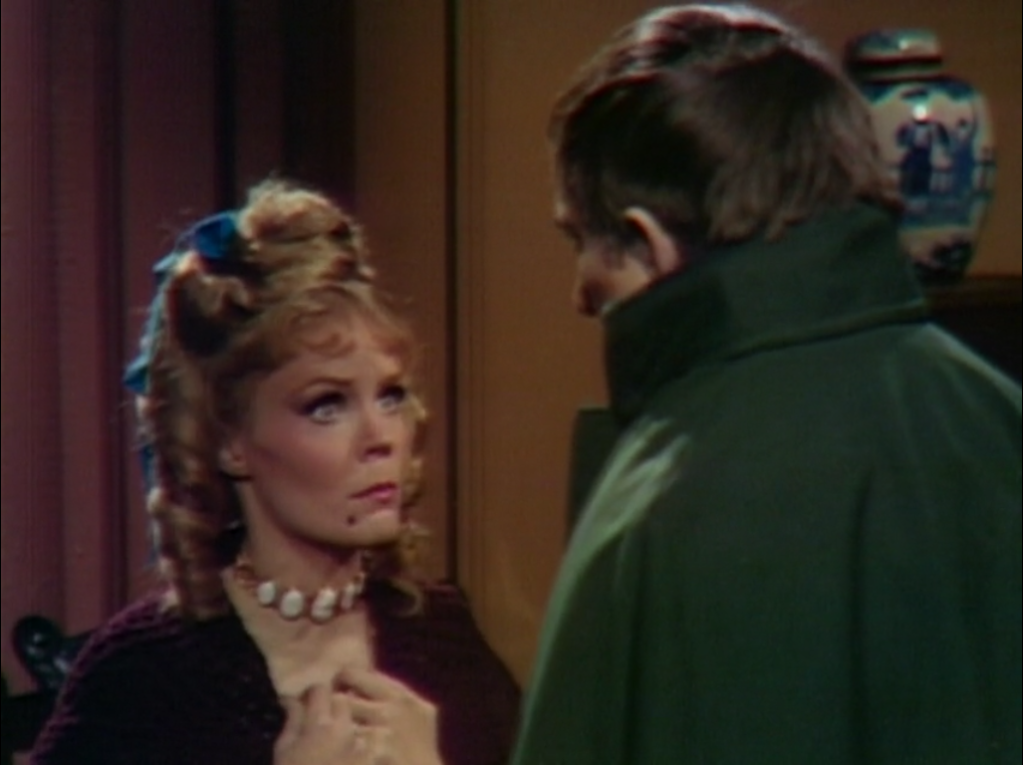
This conclusion is more impressive the more you think about it. Before Barnabas died, he and Nathan were friends, so it is reasonable that he would know Nathan has no sister. Suki is not carrying a bag or riding a horse or wearing strong boots, so she must be staying at the great house. She gives her name as Forbes, so she must be staying there as a connection of Nathan’s. Granted that she is lying about being his sister, the true nature of that connection must be something she and Nathan want to conceal from the Collinses. Barnabas knows that Nathan has persuaded Millicent to marry him, prospectively raising him from the genteel poverty of life on a junior naval officer’s salary to the great wealth of the New York branch of the Collins family. So the secret relationship must be one that would deny him that glittering prize. Suki, indeed, must be Nathan’s wife. It is a brilliantly logical inference, which makes it inexplicable that Barnabas draws it. He is a character who does smart things sometimes, foolish things frequently, but he has never before shown any great aptitude for sequential reasoning. Nonetheless, it is a wonderful moment. Wonderful moments multiply when Suki is around.
Suki is one of the most quick-witted and daring characters on the show. She recovers from the initial shock after a second or two and asks Barnabas what it is to him if she is Nathan’s wife. He speaks in his usual menacing way, and she tells him he is in no position to make threats. She recognizes Barnabas from the portrait of him that hangs in the great house. She realizes that the official story, the tale Joshua put about that Barnabas has gone to England, must be the cover for some shameful secret, and she sets about crafting a blackmail demand as her price for keeping that secret.
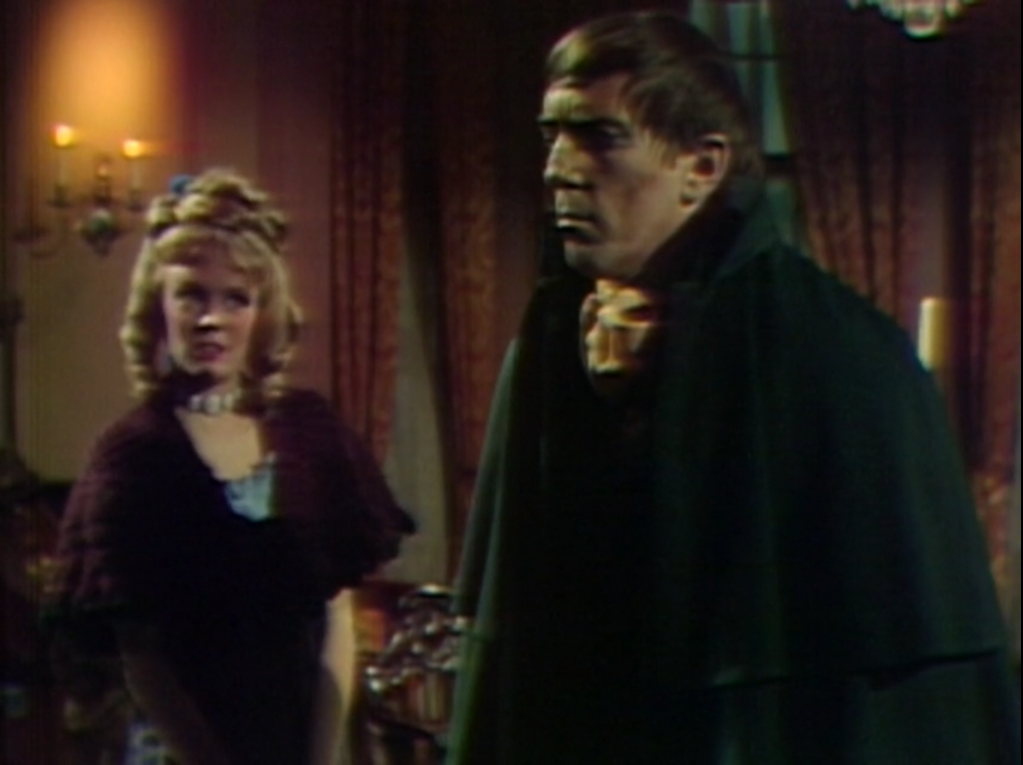
Suki finds Josette’s cloak on a chair. She realizes that Josette is in the house with Barnabas, and we see her thinking up new and higher blackmail demands.
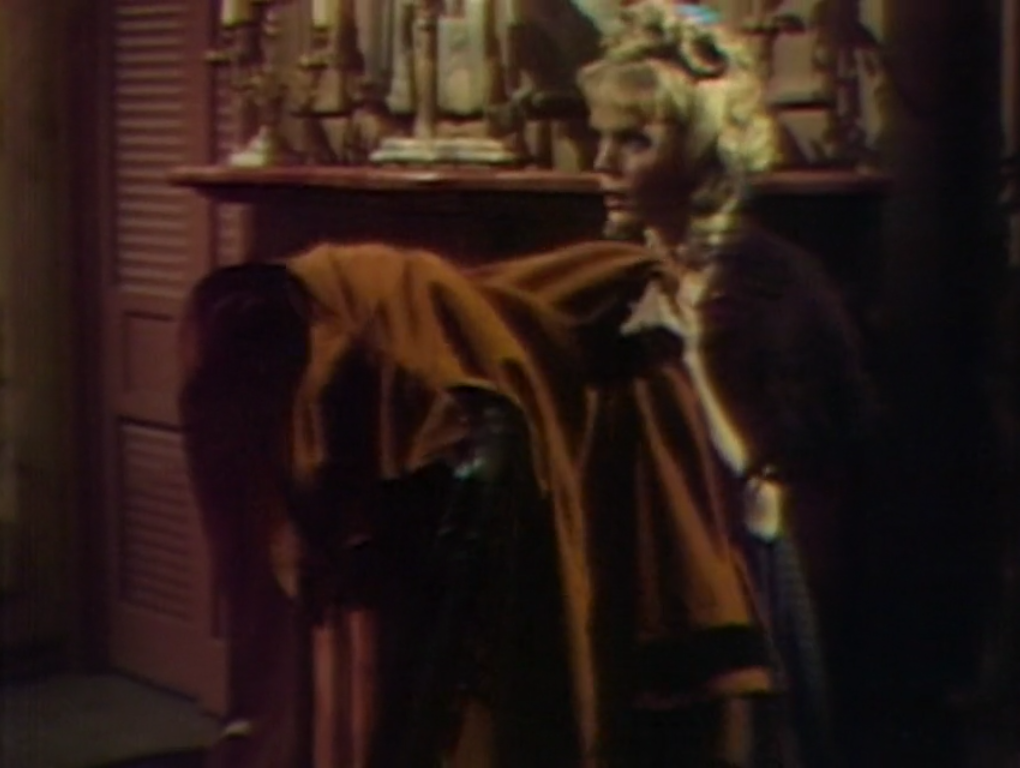
While Suki is involved with the cloak, Barnabas dematerializes. Bewildered, she looks for him in the parlor, then goes outside. A bat frightens her.
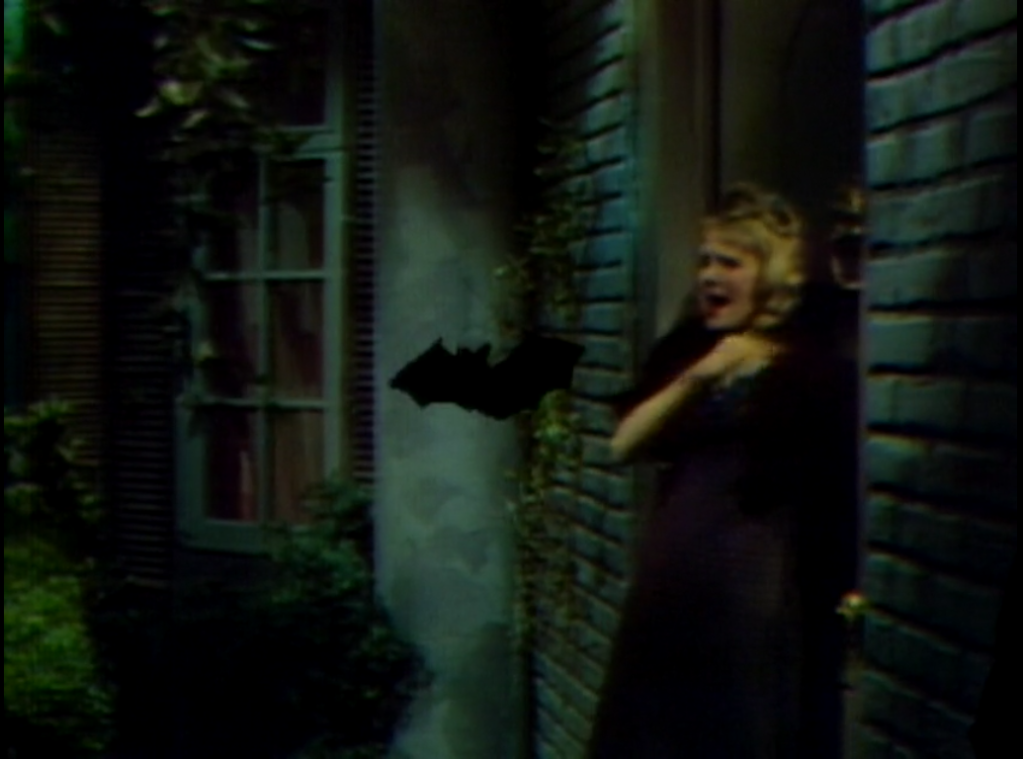
Suki retreats into the house. She melts down and starts sobbing with fear.
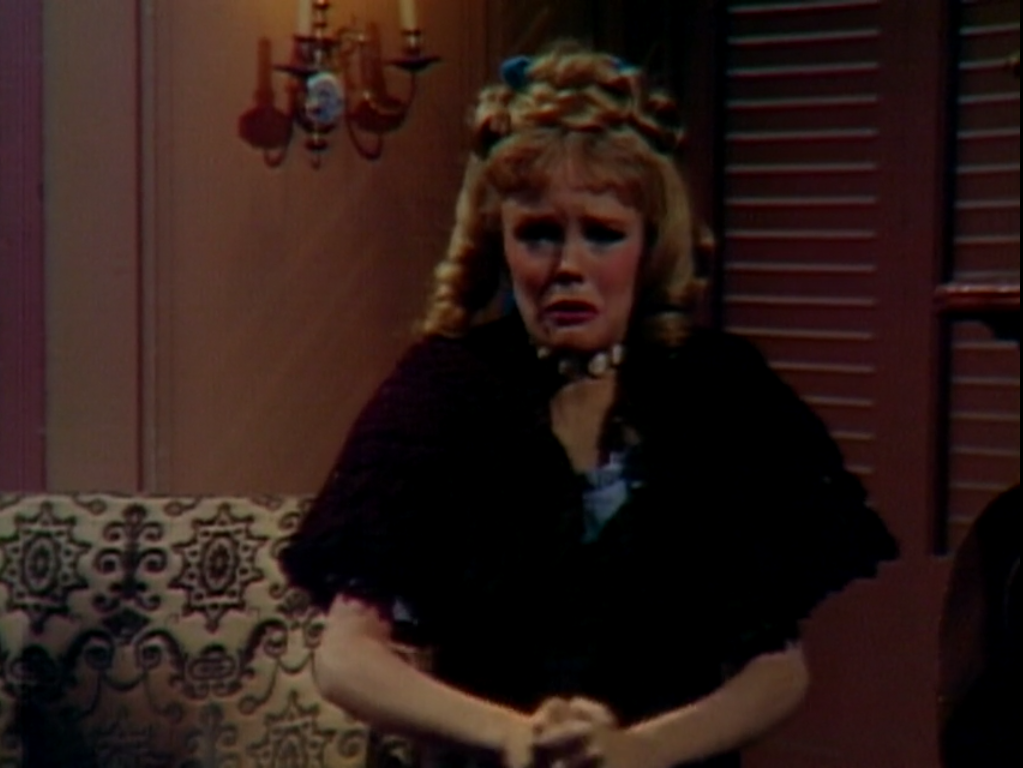
The bat reappears in the room. It hovers near the lens of the camera, then gives way to Barnabas, one of the best efforts they have made at showing Barnabas change form. Suki tells him she can’t believe what she is seeing.
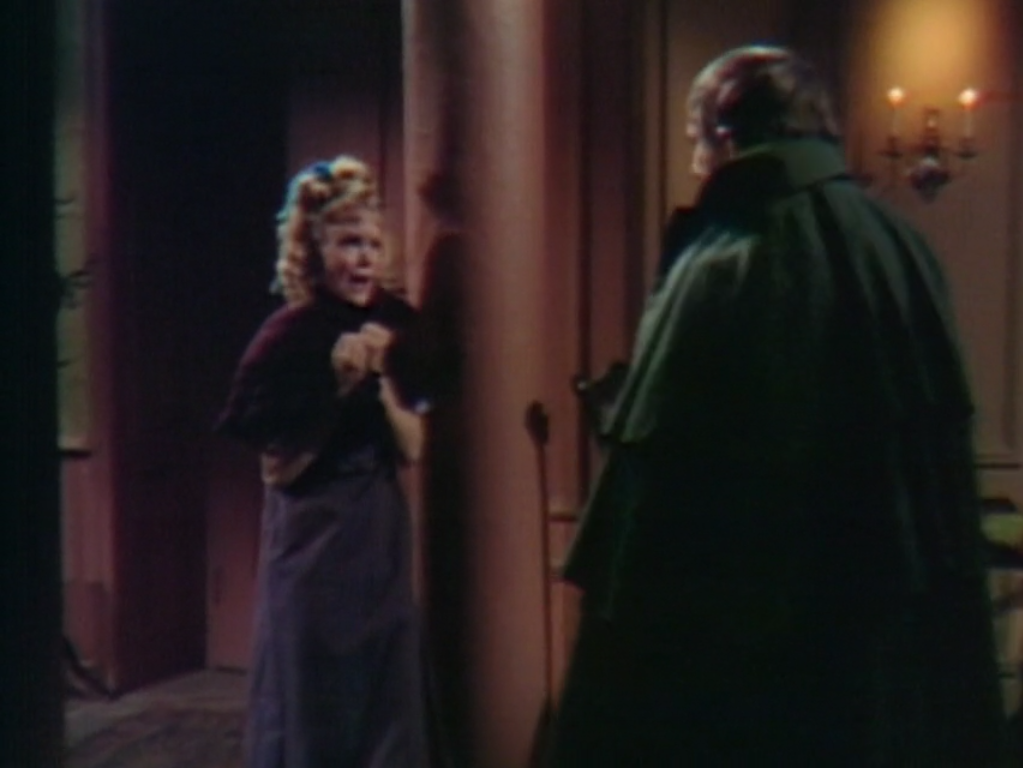
Suki brings out the best in the writing staff, driving them to show each character doing whatever it is they do that makes the biggest contribution to the show. Unfortunately, Barnabas makes his biggest contribution when he murders people. So he winds up strangling Suki at the end of this episode. It is a terrible shame that a character as dynamic as Suki is only on Dark Shadows for a few days.
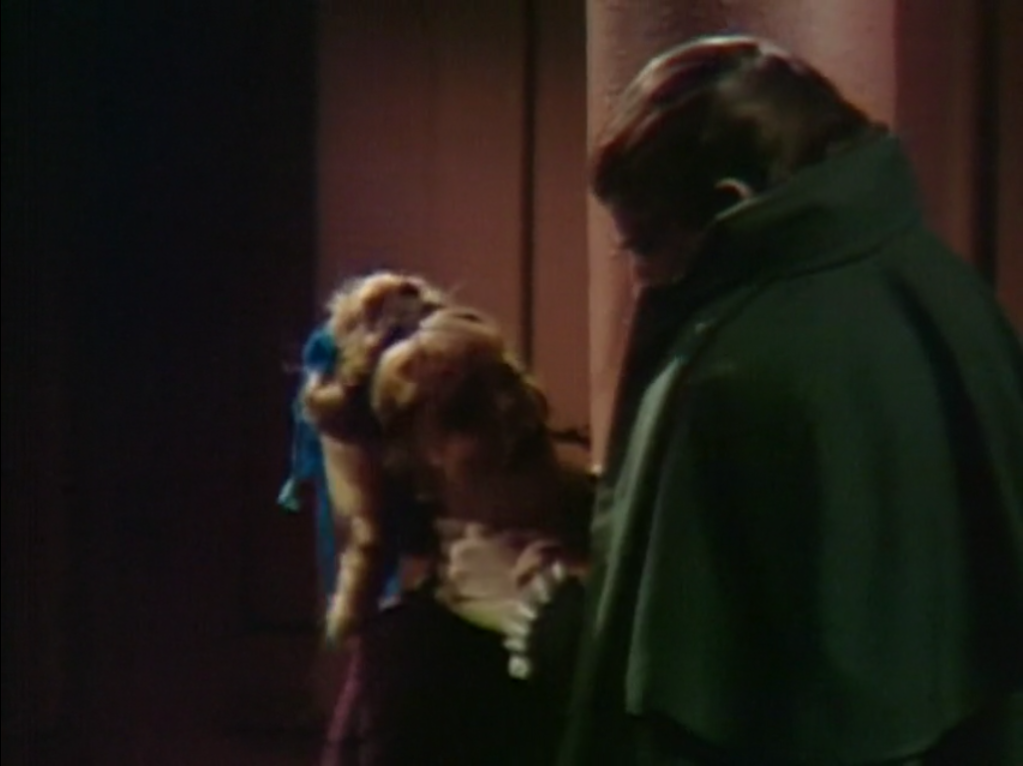
It is also a shame that Jane Draper doesn’t come back to play another part in one of the segments of Dark Shadows set in a period other than the late 18th century. Perhaps the makers of the show thought that in Nancy Barrett, who plays Millicent in the 18th century segment, Carolyn Collins Stoddard in the 1960s segments, and many other characters in segments we will see later, the show already had a tiny blonde actress with a wide range and a forceful style. Her similarities to Miss Barrett may have prompted the producers to cast Ms Draper as Millicent’s rival/ would-be exploiter/ mocking Doppelgänger. Miss Barrett’s other characters tend to be very different from Millicent. They are given to abrupt psychological reverses, alternating between acute self-consciousness and fierce self-loathing and between irritable distrust and complete emotional dependence. Her characters are usually their own mocking Doppelgänger, so that there was no need to cast another actress to play such a part. But Ms Draper is so very good as Suki that there can be little doubt she would have been able to handle any role they threw her way.








